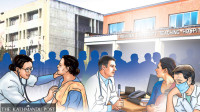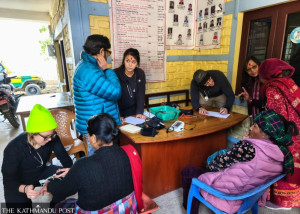Health
Gokarneshwar reopens schools, but experts say rush could prove costly
Health Ministry has said the pandemic is not over yet and children are at high risk of infections.
Arjun Poudel
Amid the ongoing Covid-19 pandemic, the Gokarneshwor Municipality in Kathmandu has allowed schools to resume in-person classes starting Tuesday.
All the academic institutions in the municipality, which were shut down after the second wave of the pandemic hit the country in April, have been permitted to run physical classes, the mayor of the municipality told the Post.
“We have made an official decision to allow in-person classes from Tuesday,” Santosh Chalise, the mayor of the municipality, said. “We consulted parents and several committees of the municipality before making the decision.”
All three districts of the Valley—Kathmandu, Bhaktapur and Lalitpur—are major hotspots of the coronavirus with over 9,000 active cases in total currently, according to the Ministry of Health and Population.
Public health experts have warned that reopening the schools in the midst of a pandemic is like inviting another major catastrophe. They said children are highly vulnerable to the infection as they are not yet immunised against Covid-19. Moreover, strict adherence to public health measures at schools is almost impossible and there is no mechanism in place to monitor if the Covid-19 safety measures are followed strictly.
“If any schools anywhere in the Valley are allowed to resume in-person classes, it could invite a disaster,” warned Dr Krishna Man Shakya, vice president of Nepal Public Health Association. “Even the vaccinated people are getting infected and cases of reinfection are being reported. We should not forget what happened when the authorities refused to shut down schools before the start of the second wave.”
Over 6,000 people died and hundreds of thousands of people were infected in the second wave of the pandemic that hit the country in April and May. Health facilities were overwhelmed with patients and several died after hospitals ran out of oxygen.
Chalise, the mayor of Gokarneshwor Municipality, said the decision to resume in-person classes was taken because students have been deprived of normal schooling for a long time. Virtual classes have not been effective, as many students do not have access to high speed internet and gadgets—laptop and mobile phones, he argued.
“It is not possible for a family to provide individual laptops for two-three children,” said Chalise. “If the children study in different grades and have classes at the same time, then they need to study in separate rooms, but our reality is that many families cannot afford to rent a flat,” he said, mentioning the practical difficulties of online classes.
He said that it is not wise to deprive the children of their fundamental right to education. When asked why his municipality decided to resume physical clases, when other local units have not taken such a decision yet, Chalise said someone needed to take a bold decision and he did.
Chalise said the chief district officer of Kathmandu contacted him on Tuesday and asked why the decision was taken without consulting with the District Administration Office. “I told him that we held consultations in the municipality and with the parents of schoolchildren before making the decision,” he said.
“I told him that we will strictly monitor whether schools are following the health protocols and social distancing in classrooms,” said Chalise. “Students will have to bring their own tiffin from home.”
Besides, all students will be required to wear face masks, maintain distance, and schools must set up handwashing stations, according to him.
But doctors say reopening schools in the midst of the pandemic is full of risks, especially considering the ongoing rapid surge in cases involving the highly contagious Delta variant of the coronavirus.
“Since we have not been conducting enough tests and do not have a proper screening system, we still do not know the scale of infections,” says Dr Basudev Pandey, a former director of the Epidemiology and Disease Control Division. “Who will be responsible if a large number of students become infected at once?”
Doctors say even if infected children do not become seriously ill, they can still pass the infection to the elder members of their families.
Chief District Officer of Kathmandu Kali Prasad Parajuli, however, said the District Administration Office has yet to decide whether to allow schools to reopen.
‘Today I spoke to the mayor of Gokarneshwor Municipality and requested him not to reopen the schools,” said Parajuli. “Our [chief district officers of the Valley] restrictions on schools and several other businesses are in effect until today and we will take a new decision tomorrow [Wednesday].”
He said police will be deployed to close the schools if any local units violated the restrictions.
The Ministry of Health and Population also said time has not come yet to reopen schools as the pandemic is not over and children are at high risk of infections.
“The Health Ministry has not recommended reopening schools,” Dr Samir Kumar Adhikari, joint spokesperson for the Health Ministry, told the Post. “Conducting physical classes is full of risks.”
The Covid-19 Crisis Management Centre, however, a few days ago permitted local administrations to enforce smart lockdowns—identifying Covid-19 hotspots and infection clusters within their jurisdictions and enforcing localised restrictions. But the centre’s spokesperson said they will not allow schools to reopen.
“We have not permitted any local units to reopen schools and have no immediate plans to do so,” said Nurhari Khatiwada, spokesperson for the centre.
Experts say before reopening schools, certain things including the number of active cases; positivity rate; the status of testing, contact tracing and active surveillance and monitoring mechanisms; and facilities for treatment, isolation and quarantining, should be taken into account.
“We need to first set up an effective screening mechanism to know the status of infection among children and other groups at the local level,” said Dr GD Thakur, a former director of the Epidemiology and Disease Control Division.
“Yes, teaching and learning activities have been affected due to the pandemic but that does not mean we should reopen schools immediately without assessing the risk.”




 9.12°C Kathmandu
9.12°C Kathmandu














